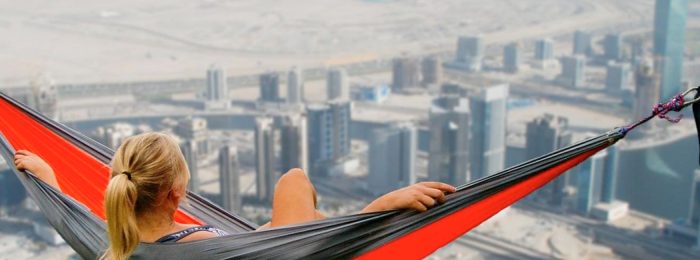As with many international markets, social media platforms are key to making market headway in the UAE. While platform-specific popularity in the UAE may not be particularly different from Western markets, understanding the space in terms of user trends and behavior, as well as cultural nuances and local regulations that come into play, could make or break your social media strategy.
Here are some things to consider for maximum social engagement in the UAE.
SOCIAL MEDIA LANDSCAPE IN THE UAE
Before we look at specific social platform use in the UAE, here are some general points that affect the social media landscape in the region.
1. 70% OF THE UAE’S POPULATION IS MALE
About 81% of the country’s residents are foreign expatriates with the largest group of residents (about 50% of the population) coming from South Asia. Connecting and engaging with your target audience, and in the right language, may be more nuanced than with other foreign markets. Upfront research will be key to a successful strategy.
2. THE EMIRATI GOVERNMENT REGULATES SOCIAL MEDIA AND ADVERTISING CONTENT
Your messaging must respect local socio-cultural values. And reference to Western lifestyle norms, which often form part of domestic marketing content, could raise a serious red flag in the UAE.
Additionally, publishing misleading information or opinions, such as inaccurate claims or overt reference to the competition, is banned. Privacy and security is also regulated, meaning that Voice over Internet Provider (VoIP) enabled technology is under strict control, and calling features (such as those on WhatsApp, Facebook, Viber, Snapchat and Skype) are all disabled in the UAE.
So, fact-checking and sense-checking everything for cultural and regulatory appropriateness is critical. Make sure your localization partner is working with in-country, subject-matter experts experienced in both your vertical and social media marketing to keep your in-country efforts on track.
3. INFLUENCERS ARE HUGELY POPULAR
71% of residents are keen to take online advice before purchasing. This is particularly true for beauty, fashion and food products, with 63% of online consumers more likely to buy these products based on an influencer’s recommendations.
But partnering with influencers can be a pricey strategy. Influencers are also regulated, so they have to pay around $4,000 to get a license from the National Media Council.
This is good news for brands because it means all registered influencers are serious about the business and passionate about their work. But the bad news is this makes them the most expensive influencers in the world – on average they charge $274 per Instagram post.
POPULAR SOCIAL PLATFORMS IN THE UAE
1. FACEBOOK
After social chat platform WhatsApp, Facebook is the most popular social media platform, with 90% of the country’s internet users active on the platform.
Male users aged between 25 and 34 represent the largest demographic on Facebook with key interests including travel, fashion and gaming. Expats, however, make up three-quarters of Facebook users in the UAE, and English posts outnumber Arabic posts by almost four times. Making sure you know your target audience thoroughly, and adapting your content localization strategy to account for their linguistic preferences, will be key to maximizing engagement.
Choosing the right moment to launch your Facebook campaign could also be key, as usage surges at certain times of the year. During Ramadan, for example, UAE users spend 5% more time on social media than usual, so this can be a good time for brands to maximize their exposure.
2. TWITTER
41% of users in the UAE have a Twitter account. But as with Facebook, only one-third of users post in Arabic. If you’re targeting Emirati citizens, Arabic could be the right language for you. But if you want to capture Dubai’s more international audience, you may want to stick with English, depending on what you’re promoting in-country.
The most common interests on Twitter in the UAE are fitness, sports, fashion and travel, so it may be worth aligning your brand and content strategy with these popular lifestyle trends to gain maximum exposure.
3. YOUTUBE
The UAE represents one of the highest regions for smartphone penetration in the world, and that, combined with increasing availability of super-fast internet at very low prices, has contributed to an explosion in video consumption in recent years.
Ericsson’s Mobility Report estimates that social media use via mobile – which currently accounts for 15% of mobile data – will grow by 39% over the next six years and that this trend will only be outgrown by video consumption. With an estimated 7.47 million users on YouTube in 2018 and considerable growth expected, video is a potentially large opportunity for UAE engagement.
4. INSTAGRAM
53% of online users in the UAE have an Instagram account. With more than 5 million active users, Instagram is popular across a younger demographic with interests trending across fashion, food and fitness. In contrast to other international market trends, just 38% of active Instagram users in the UAE are female. But it remains an effective platform for reaching and engaging with a female target audience.
J.P. MORGAN’S MULTI-CHANNEL UAE SUCCESS
J.P. Morgan’s sponsorship of the 2016 Dubai Duty Free Tennis Championship showcased content from the tournament, alongside scenes of UAE culture and history, across multiple social platforms. They set up a @jpmorgan Periscope channel for the campaign and showed the Tennis Championships on its first livestream while also creating a 360° video experience from the Burj Khalifa – in both English and Arabic – which aired on Facebook and YouTube. The campaign was a success, increasing their social engagement in the region by 140 times.
FINAL THOUGHT
Social media in the UAE is an excellent opportunity for your brand. Its wide popularity provides a great way for brands to connect with customers. By considering cultural and linguistic nuances, knowing who and where your target audience is and getting creative with truly localized social media campaigns, you can successfully engage with the growing UAE market.


